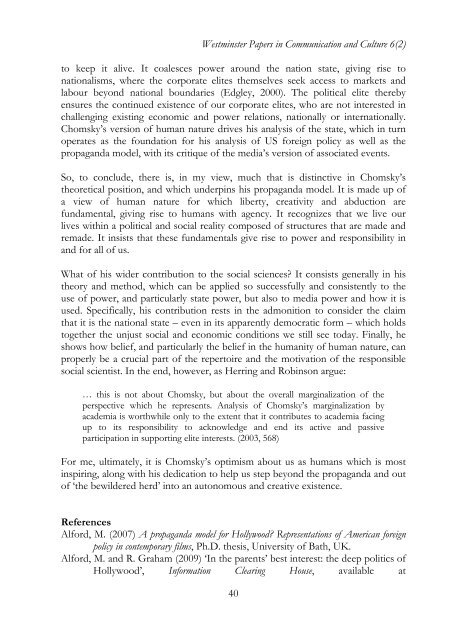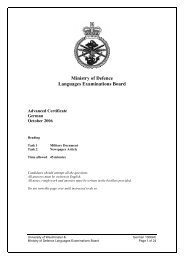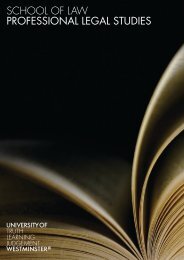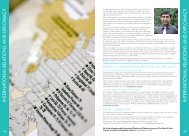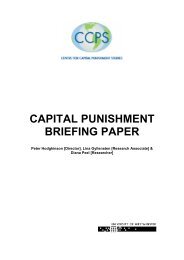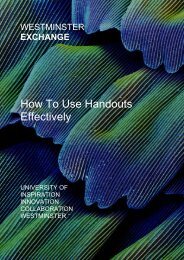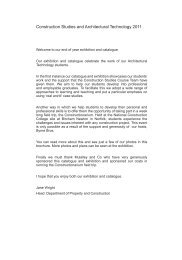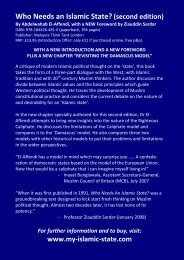Social Science, Rhetoric and Chomsky's Critique - Alison Edgley
Social Science, Rhetoric and Chomsky's Critique - Alison Edgley
Social Science, Rhetoric and Chomsky's Critique - Alison Edgley
Create successful ePaper yourself
Turn your PDF publications into a flip-book with our unique Google optimized e-Paper software.
Westminster Papers in Communication <strong>and</strong> Culture 6(2)to keep it alive. It coalesces power around the nation state, giving rise tonationalisms, where the corporate elites themselves seek access to markets <strong>and</strong>labour beyond national boundaries (<strong>Edgley</strong>, 2000). The political elite therebyensures the continued existence of our corporate elites, who are not interested inchallenging existing economic <strong>and</strong> power relations, nationally or internationally.Chomsky’s version of human nature drives his analysis of the state, which in turnoperates as the foundation for his analysis of US foreign policy as well as thepropag<strong>and</strong>a model, with its critique of the media’s version of associated events.So, to conclude, there is, in my view, much that is distinctive in Chomsky’stheoretical position, <strong>and</strong> which underpins his propag<strong>and</strong>a model. It is made up ofa view of human nature for which liberty, creativity <strong>and</strong> abduction arefundamental, giving rise to humans with agency. It recognizes that we live ourlives within a political <strong>and</strong> social reality composed of structures that are made <strong>and</strong>remade. It insists that these fundamentals give rise to power <strong>and</strong> responsibility in<strong>and</strong> for all of us.What of his wider contribution to the social sciences? It consists generally in histheory <strong>and</strong> method, which can be applied so successfully <strong>and</strong> consistently to theuse of power, <strong>and</strong> particularly state power, but also to media power <strong>and</strong> how it isused. Specifically, his contribution rests in the admonition to consider the claimthat it is the national state – even in its apparently democratic form – which holdstogether the unjust social <strong>and</strong> economic conditions we still see today. Finally, heshows how belief, <strong>and</strong> particularly the belief in the humanity of human nature, canproperly be a crucial part of the repertoire <strong>and</strong> the motivation of the responsiblesocial scientist. In the end, however, as Herring <strong>and</strong> Robinson argue:… this is not about Chomsky, but about the overall marginalization of theperspective which he represents. Analysis of Chomsky’s marginalization byacademia is worthwhile only to the extent that it contributes to academia facingup to its responsibility to acknowledge <strong>and</strong> end its active <strong>and</strong> passiveparticipation in supporting elite interests. (2003, 568)For me, ultimately, it is Chomsky’s optimism about us as humans which is mostinspiring, along with his dedication to help us step beyond the propag<strong>and</strong>a <strong>and</strong> outof ‘the bewildered herd’ into an autonomous <strong>and</strong> creative existence.ReferencesAlford, M. (2007) A propag<strong>and</strong>a model for Hollywood? Representations of American foreignpolicy in contemporary films, Ph.D. thesis, University of Bath, UK.Alford, M. <strong>and</strong> R. Graham (2009) ‘In the parents’ best interest: the deep politics ofHollywood’, Information Clearing House, available at40


